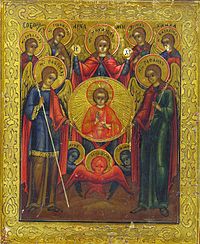Seven Archangels
| It has been suggested that Saint Archangel be merged into this article or section. (Discuss) |
| This article needs attention from an expert on the subject. See the talk page for details. WikiProject Eastern Orthodoxy may be able to help recruit an expert. (November 2008) |
| This article needs attention from an expert on the subject. See the talk page for details. WikiProject Religion or the Religion Portal may be able to help recruit an expert. (November 2008) |

Contents[hide] |
[edit] Early and Medieval Church Angelology
In the late 5th to early 6th century, Pseudo-Dionysius gives them as Michael, Gabriel, Raphael, Uriel, Chamuel, Jophiel, and Zadkiel.The earliest Christian mention is by Pope Saint Gregory I who lists them as Michael, Gabriel, Raphael, Uriel (or Anael), Simiel (or Samael), Oriphiel and Zachariel. A later reference to seven archangels would appear in an 8th or 9th century talisman attributed to Auriolus, a "servant of God" in north-western Spain. He issues a prayer to "all you patriarchs Michael, Gabriel, Cecitiel, Oriel, Raphael, Ananiel, Marmoniel, who hold the clouds in your hands"[1]
[edit] Archangels in current church traditions
The Eastern Orthodoxy tradition venerates Michael, Gabriel, Raphael, Uriel, Selaphiel, Jegudiel, and Barachiel.Another Catholic variation lists them corresponding to the days of the week as: St Michael (Sunday), St Gabriel (Monday), St Raphael (Tuesday), St Uriel (Wednesday), St Sealtiel (or sometimes Metatron) (Thursday), St Jegudiel, (Friday), and St Barachiel (Saturday).
Four important archangels also display periodic spiritual activity over the seasons: Spring is Raphael, Summer - Uriel, Autumn - Michael and Winter is Gabriel.
In the Coptic Orthodox tradition the seven archangels are named as Michael, Gabriel, Raphael, Suriel, Zadakiel, Sarathiel and Aniel.
It is important to note that the Roman Catholic Church only recognizes 3 archangels: Michael, Gabriel, and Raphael.
In Anglican and Episcopal tradition, there are three or four archangels in its calendar for September 29 feast for St. Michael and All Angels (also called Michaelmas: namely Michael, Gabriel and Raphael,[2] and often, Uriel.[3][4][5][6][7]
In the more modern angelology, different sources disagree on the names and identities of the seven archangels. In the Book of Enoch, Remiel is also described as one of the leaders of the 200 Grigori, the fallen angels. Various occult systems associate each archangel with one of the traditional seven "luminaries" — the Sun, Moon, Mars, Mercury, Jupiter, Venus, and Saturn — but there is disagreement as to which archangel corresponds to which body.
The seven archangels figure in some systems of ritual magic, each archangel bearing a specific seal.
[edit] See also
[edit] Notes and references
- ^ Julia M.H. Smith, Europe After Rome: A New Cultural History 500-1000. Oxford: Oxford University Press, 2005. Page 77
- ^ Oremus.org website. Retrieved September 15, 2008.
- ^ Saint Uriel Church website patron Saint web page. Retrieved September 15, 2008.
- ^ Lesser Feasts and Fasts, p. 380.
- ^ Anglican.org website Michaelmas page. Retrieved September 15, 2008.
- ^ St. George's Lennoxville website, What Are Anglicans, Anyway? page. Retrieved September 15, 2008.
- ^ Christ Church Eureka website, September Feasts page. Retrieved September 15, 2008.
- Godwin, Malcolm. Angels: An Endangered Species, New York: Simon & Schuster 1990/ London: Boxtree 1993.
- Benor, Daniel J. Healing Research, Volume III — Personal Spirituality: Science, Spirit and the Eternal Soul, Bellmawr, NJ: Wholistic Healing Publications 2006
